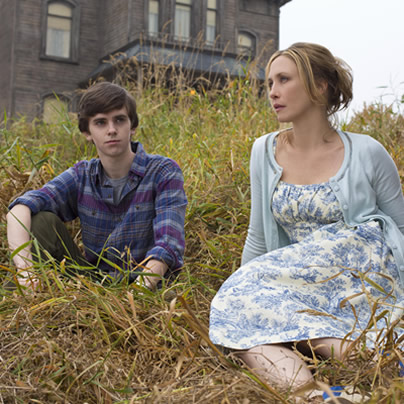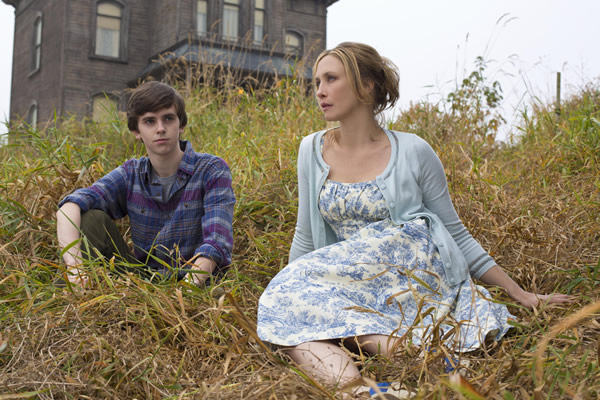Arts & Entertainment
TV: Something old, something new
‘Development’ not so arrested, ‘Psycho’ gets reboot and interesting reality participants sign on


Freddie Highmore as Norman Bates and Vera Farmiga as his mother in A&E’s new series’ ‘Bates Motel.’ The famous creepy old house, seen here in the background, was rebuilt in Vancouver for the new show. Look for it March 18 at 10 p.m. (Photo courtesy A&E)
The 22nd season of CBS’s “The Amazing Race” is in full swing. Contestants include a team of YouTube hosts, Joey Graceffa and Meghan Camarena. Episodes air Sundays at 8 p.m., and the season will run until May 5.
After seven years off the air, “Arrested Development” fans will rejoice when the show returns for a fourth season in May on Netflix. Portia de Rossi, Jason Bateman and the rest of the Bluth family are reuniting along with some of the series’ famous recurring stars, including Liza Minnelli. Kristin Wiig will join the cast, playing a young Lucille Bluth.
In addition to his time as a Bluth, Tony Hale returns to “Veep,” starring Julia Louis-Dreyfus as Vice President Selina Meyer. The new season premieres April 14 on HBO.
“Celebrity Apprentice” returns to NBC with its first All Star edition on Sunday at 9 p.m. Celebrities returning to the competition include Penn Jillette, LaToya Jackson and Lisa Rinna. Omarosa will compete in the show for the third time. Past winners Joan Rivers and Piers Morgan will appear as guest judges.
CBS’s “How I Met Your Mother,” starring Neil Patrick Harris, continues to air Mondays at 8 p.m. This season saw the return of Rachel Bilson as Ted’s lesbian ex-girlfriend and the latest installment in the Robin Sparkles opus. The season finale is on May 13.
A new web series, “The 3 Bits,” launches soon. Promoted as “a queer show about sex, love, booze, drugs, friendship, family and amazing acts of stupidity,” the show stars Cole Escola who tries to navigate issues like online dating, STDs and foot fetishism. A preview for the upcoming series can be found on the3bits.com.
A&E premieres “Bates Motel” on March 18 at 10 p.m. The series depicts the early life of Norman Bates, a character immortalized by late gay actor Anthony Perkins in “Psycho.” The show stars Freddie Highmore as Norman Bates and Vera Farmiga as his mother Norma.
“Happy Endings,” starring Adam Pally and Casey Wilson, returns from its hiatus on March 29 at 8 p.m. on ABC with back-to-back episodes. RuPaul will make a guest appearance this season, as will Abby Elliot, reuniting with fellow SNL alum Casey Wilson. With the show’s move to the “Friday night death slot,” the future of the GLAAD Media Award-nominated sitcom is uncertain.
Bravo debuts a new reality show called “Dukes of Melrose” on March 6 at 10:30 p.m. The series will follow Christos Garkinos and Cameron Silver, owners of the couture store Decades. It follows the season premiere of “It’s a Brad, Brad World” at 10 p.m.
“Ke$ha: My Crazy Beautiful Life” airs on MTV on April 23 at 11 p.m. The documentary covers the drama in Ke$ha’s personal and professional life over the past two years and the making of her album “Warrior.”
Courtney Cox will join fellow “Friends” alum Matthew Perry in an April episode of NBC’s struggling sitcom “Go On.” This will be Cox and Perry’s first television appearance together since playing married couple Chandler and Monica. The series airs on Tuesdays at 9 p.m.
Sarah Chalke stars in ABC’s “How to Live with Your Parents (For the Rest of Your Life).” Chalke plays a recently divorced mother forced to move back home with her parents. Elizabeth Perkins plays her vulgar mom with a rich sexual past. The show premieres April 3 at 9:30 p.m.
http://www.youtube.com/watch?v=5vWkCY_NQJg
Just because the Oscars have passed doesn’t mean awards season is over. Rebel Wilson hosts the MTV Movie Awards on April 14 at 9 p.m., and Blake Shelton and Luke Bryan will host the Academy of Country Music Awards on April 7 at 8 p.m. on CBS. Taylor Swift is nominated to win her third consecutive Entertainer of the Year at the ACMs.
“Shameless” continues its third season on Showtime on Sundays at 9 p.m. Fiona tries to keep the Gallagher family together despite issues with her alcoholic father, a run-in with child protective services, and Ian’s affair with Jimmy’s dad Lloyd. “The West Wing” alum Bradley Whitford will appear on the show in a multi-episode arc, playing a sophisticated gay man and political activist. The season finale airs April 7.
A new season of HBO’s “True Blood” starts June 9 at 9 p.m. It picks up where season five left off: Bill turned evil and empowered himself with Lilith’s blood, Sookie and the gang are trying to escape the Authority, Andy was forced to raise four fairy babies and the mystery surrounding the vampire Warlow began unfolding.
“Game of Thrones” returns to HBO March 31 at 10 p.m. Winter is coming to Westeros as Arya Stark continues her quest to reunite with her family, Sansa tries to escape from King Joffrey, Daenerys uses her dragons to reclaim her family’s throne and a swarm of White Walkers descends on the Night’s Watch camp.
Out & About
Plan your wedding the LGBTQ way
Washington D.C. LGBTQ+ Wedding Expo scheduled for Sunday

Rainbow Wedding Network will host “Washington D.C. LGBTQ+ Wedding Expo” on Sunday, March 1 at 12:30 p.m.
Guests can meet and mingle with a curated selection of LGBTQ-welcoming wedding professionals from across the region, each ready to help bring your vision to life, and spend a beautiful afternoon exploring everything they need to create a celebration that reflects them.
There will be a relaxed, self-guided look at the Watergate’s spaces and amenities, savor signature cocktails and delicious tasting samples, and connect with other couples who are on the same journey.
Visit Eventbrite to reserve a spot.

Friday, February 27
Center Aging Monthly Luncheon With Yoga and Drag Bingo will be at 12 p.m. at the DC Center for the LGBT Community. Email Mac at [email protected] if you require ASL interpreter assistance, have any dietary restrictions, or questions about this event.
Go Gay DC will host “LGBTQ+ Community Happy Hour Meetup” at 7 p.m. at Freddie’s Beach Bar and Restaurant. This is a chance to relax, make new friends, and enjoy happy hour specials at this classic retro venue. Attendance is free and more details are available on Eventbrite.
Trans Discussion Group will be at 7 p.m. on Zoom. This group is intended to provide an emotionally and physically safe space for trans people and those who may be questioning their gender identity/expression to join together in community and learn from one another. For more details, email [email protected].
Saturday, February 28
Go Gay DC will host “LGBTQ+ Community Brunch” at 11 a.m. at Freddie’s Beach Bar & Restaurant. This fun weekly event brings the DMV area LGBTQ+ community, including allies, together for delicious food and conversation. Attendance is free and more details are available on Eventbrite.
The DC Center for the LGBT Community will host “Sunday Supper on Saturday” at 2 p.m. It’s more than just an event; it’s an opportunity to step away from the busyness of life and invest in something meaningful, and enjoy delicious food, genuine laughter, and conversations that spark connection and inspiration. For more details, visit the Center’s website.
Black Lesbian Support Group will be at 1 p.m. on Zoom. This is a peer-led support group devoted to the joys and challenges of being a Black lesbian. You do not need to be a member of the Beta Kappa Chapter or the Beta Phi Omega Sorority in order to join, but they do ask that you either identify as a lesbian or are questioning that aspect of your identity.Send an email to [email protected] to receive the zoom link.
Sunday, March 1
LGBTQ+ Community Coffee and Conversation will be at 12 p.m. at As You Are. This event is for people looking to make more friends and meaningful connections in the LGBTQ community. Attendance is free and more details are available on Eventbrite.
Monday, March 2
“Center Aging: Monday Coffee Klatch” will be at 10 a.m. on Zoom. This is a social hour for older LGBTQ+ adults. Guests are encouraged to bring a beverage of choice. For more information, contact Adam ([email protected]).
Tuesday, March 3
Universal Pride Meeting will be at 7 p.m. on Zoom. This group seeks to support, educate, empower, and create change for people with disabilities. For more details, email [email protected].
Wednesday, March 4
Job Club will be at 6 p.m. on Zoom upon request. This is a weekly job support program to help job entrants and seekers, including the long-term unemployed, improve self-confidence, motivation, resilience and productivity for effective job searches and networking — allowing participants to move away from being merely “applicants” toward being “candidates.” For more information, email [email protected] or visit www.thedccenter.org/careers.
Center Aging Women’s Social and Discussion Group will be at 6 p.m. on Zoom. This group is a place where older LGBTQ+ women can meet and socialize with one another. There will be discussion, activities, and a chance for guests to share what they want future events to include. For more information, email [email protected].
Thursday, March 5
The DC Center’s Fresh Produce Program will be held all day at the DC Center for the LGBT Community. People will be informed on Wednesday at 5 p.m. if they are picked to receive a produce box. No proof of residency or income is required. For more information, email [email protected] or call 202-682-2245.
Virtual Yoga Class will be at 7 p.m. on Zoom. This free weekly class is a combination of yoga, breathwork and meditation that allows LGBTQ+ community members to continue their healing journey with somatic and mindfulness practices. For more details, visit the DC Center’s website.
a&e features
Transmission DC breathes new life into a storied sound space
A fresh home for boundary-pushing culture on H Street

Late last year, phoenix-style, a fresh home for boundary-pushing culture arose on the H Street corridor. Transmission DC – a queer, trans, and POC-owned, operated, and centered community-focused venue – powered on in the former home to the Rock & Roll Hotel (famously, not a hotel, but very much rock & roll). Transmission (1353 H St., N.E.) arrives secure in its mandate – or even birthright – to provide a place to celebrate creativity and music through a lens of inclusivity and respect.
Transmission’s team brings experience, but also representation. Owners/partners Kabir Khanna (who is also programming director), Katii B, Ellie McDyre, and Kelli Kerrigan together previously managed 618 productions, a venue in Chinatown, crafting “some of D.C.’s freakiest parties, raves, and mosh pits” they note.
They packed up operations last fall to a space curated specifically for D.C.’s underground music and culture scene, building their efforts in Chinatown to bring in more fans in queer and POC circles.
Transmission, Khanna points out, is built on DIY values. In the music scene, DIY means that promoters and organizers – often disconnected from the mainstream and part of marginalized communities – build shows and programs collaboratively, but independently from institutions, supporting each other as smaller, independent venues close. Here, Transmission aims to ensure that those putting together these underground inclusive shows have a more permanent and stable home, can have access to resources, and can provide more sustainable income to artists. “We’re trying to get more people to support and enjoy the music, and also give artists and organizers within the DIY community more structure and a larger cut,” says Khanna.
Khanna also notes that Transmission operates “under the principles of safety, inclusivity, and respect.” McDyre added that even at venues that claim inclusivity, that statement might not take place in practice. We’re “not just pitting up a rainbow flag,” says McDyre, but as some of the owners are trans and POC, audiences can see themselves reflected at the top.
Much like the DIY nature of the music community, the Transmission owners brought a DIY ethos to turning around their space.
In March 2020 – the height of COVID lockdowns – Rock & Roll Hotel suddenly shuttered, though not due to the pandemic; instead, the venue claimed that decreasing sales and increasing competition led to the closure. For 14 years, it was the central spot for cheap beer and lesser-known and celebrated acts. The space stood vacant for more than five years, until Transmission turned the power back on.
“When we got into the space, it was effectively abandoned for years,” says Khanna. “There was a ton of mold, and paint primer covering all surfaces. It was nearly falling apart.” Khanna noted that many music venues like this one, regardless of how well it was maintained, “get the shit kicked out of it,” given the nature of shows. The team called in mold removal contractors, ripped up most of the floorboards, and started fresh.
Transmission’s first floor is styled as a stripped-down black box: the better to take in the music. “It’s minimal on purpose to act as a canvas for set design and music,” without a specific aesthetic, says Khanna. Moving upstairs, the second floor has been opened up, removing some walls, and now has a larger dance area than the first floor. Beyond the first two performance levels, and a holdover from Rock & Roll Hotel, is the rooftop. Though without a stage, the rooftop space is filled with murals splashed across the walls, with a full bar. Transmission’s current capacity is 496, but the team is looking to grow that number. Transmission will also leverage the full kitchen that Rock & Roll Hotel operated, bringing in Third Hand Kitchen to offer a variety of food, including vegan and vegetarian options.
Khanna pointed out an upcoming show reflective of Transmission’s inclusive ethos: Black Techo Matters on Feb. 27. The event is set to be “a dynamic, collaborative night of underground electronic music celebrating Black History Month.” Khanna says that techno came from Black music origins, and this event will celebrate this genesis with a host of artists, including DJ Stingray 313, Carlos Souffront, and Femanyst.
















